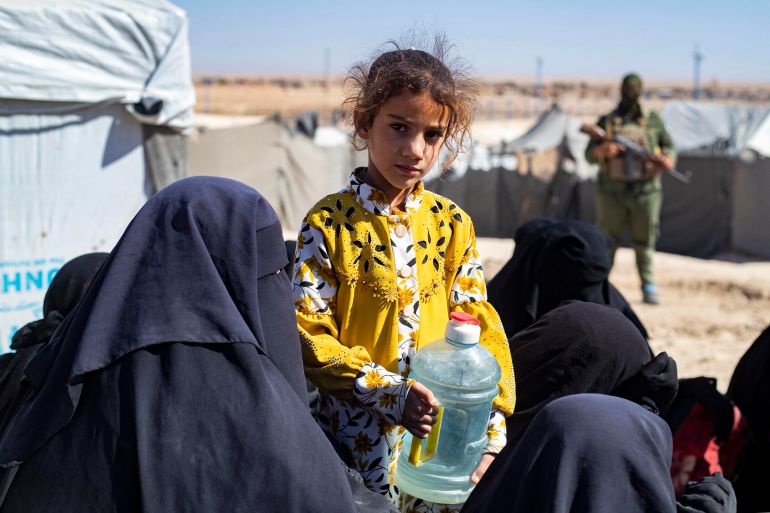HRW: More must be done to help ISIL camp repatriates reintegrate
New Human Rights Watch report shows repatriated children facing reintegration issues while thousands remain detained.

The reintegration into society of thousands of children repatriated from camps in northeast Syria for suspected members of ISIL (ISIS) is being made more difficult by the policies of several mainly-European governments, Human Rights Watch (HRW) has said.
“Our interviews and surveys found that while many children are reintegrating successfully into their new communities, policy choices by some governments have made reintegration more difficult, and in some cases, even caused additional harm,” the New York-based organisation said in a new report released on Monday.
Keep reading
list of 3 itemsChildren in Syria’s Idlib hold their own World Cup
In Syria, facing cholera and corruption
HRW said in some countries, including Belgium, France, the Netherlands, and Sweden, “authorities have immediately separated children from their mothers upon their return, either because the mother is subject to investigation or is being charged with ISIS-related offenses”.
“Some interviewees said that the most traumatic experience in the lives of their children was not the hardships of the camps, but separation from their mothers upon arrival in their new home country,” the group added.
The report is based on the experiences of more than 100 children, aged between two and 17, who were brought back – or, in some cases, brought for the first time – to their country of nationality between 2019 and 2022. The majority were repatriated or returned from northeast Syria, and a small number were returned from Iraq.
In 2019, when the United States-backed Syrian Democratic Forces (SDF) toppled ISIL’s last stronghold in Baghouz, in northeast Syria, the SDF transferred thousands of people who had been living under ISIL to makeshift prisons and detention camps. The detainees included suspected male ISIL fighters and their relatives from more than 60 countries.
Since 2019, about three dozen countries have repatriated or facilitated the return of some of their detained nationals, including more than 1,500 children, according to HRW. Denmark, Finland, Germany, Kazakhstan, Kosovo, Russia, Sweden, Tajikistan, Ukraine, the US, and Uzbekistan are among some of the countries that have now repatriated many or most of their nationals.
HRW said as of September 2022, the SDF still held approximately 56,000 individuals – nearly all of them women and children – in al-Hol and Roj, two heavily guarded, open-air camps in northeast Syria encircled by barbed wire. Of them, more than 18,000 are Syrian, approximately 28,000 from neighbouring Iraq, and more than 10,000 others are women and children from dozens of other foreign countries.
Of the non-Syrians in the camps, more than 60 percent are children. None of the foreigners in the camps and prisons has been charged with any crime, HRW said. “Nor have any ever appeared before a judge to review the legality and necessity of their detention. Therefore, their detention is clearly unlawful.”
While families of imprisoned Syrian boys can visit them, detained foreign boys are rarely allowed in-person or phone contact with their mothers and siblings in the camps, interviewees told HRW. Several hundred foreign boys are also held in locked “rehabilitation centers” or in military prisons for about 10,000 men suspected of ISIL links.
Those who remain in the camps are “indefinitely held in conditions that are life-threatening and so deeply degrading that they may amount to torture”, HRW said.
“Detainees lack adequate food, water, and shelter, and hundreds, including children, have died from preventable diseases, accidents, and camp violence,” they added.
In their recommendations, the rights group said governments should repatriate all their nationals immediately and “ensure all mothers or other adult guardians together with their children can return home immediately, absent compelling evidence that separation is in the best interest of the child, in line with international legal obligations with respect to family unity”.